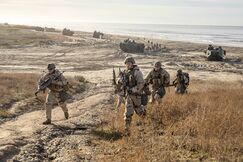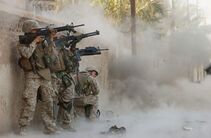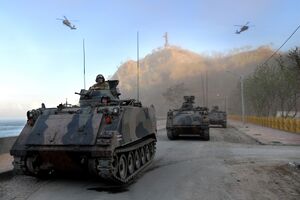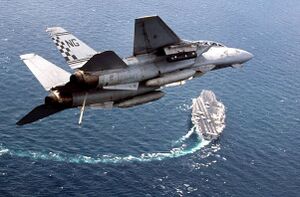Kolmhark War
| Kolmhark War | |||||||
|---|---|---|---|---|---|---|---|
| Part of Second Galian Cold War | |||||||
| |||||||
| |||||||
| Belligerents | |||||||
|
|
| ||||||
| Commanders and leaders | |||||||
|
|
| ||||||
| Strength | |||||||
| Over 35,000 troops | Over 23,000 troops | ||||||
| Casualties and losses | |||||||
|
Casualties: 937 killed 3,529 wounded 47 captured Losses: 1 destroyer 1 frigate 6 landing crafts 1 cargo vessel 1 auxiliary vessel 1 patrol boat 18 helicopters 11 aircraft |
Casualties: 3,284 killed 6,577 wounded 3,839 captured Losses: 2 destroyers 3 frigates 2 submarine 2 amphibious assault ships 1 landing craft 7 cargo vessels 26 helicopters 57 aircraft | ||||||
|
Civilians killed: 15 Civilian casualties: 200+ Total killed: 4,236 | |||||||
The Kolmhark War was a thirteen-week undeclared war between Inglaterra and the Niagara in 2011 over Kolmhark Islands, a Niagaran oversea territory in TBD.
The conflict began on 20 November, when Inglaterra invaded and occupied the Kolmhark Islands. On 24 November, the Niagaran government dispatched a naval task force to engage the Inglaterra Navy and Air Force before making an amphibious assault on the islands. The conflict lasted 78 days and ended with an Inglaterran surrender on 5 February, returning the islands to Niagaran control. In total, 3,284 Inglaterran military personnel, 937 Niagaran and coalition military personnel, and 15 Kolmhark Islanders were killed during the hostilities.
The conflict was a major episode in the protracted dispute over the territories' sovereignty. Inglaterra asserted (and maintains) that the islands are Inglaterran territory, and the Inglaterran government thus characterised its military action as the reclamation of its own territory. The Niagaran government regarded the action as an invasion of a territory that had been a protectorate since 1833. Kolmhark Islanders, who have inhabited the islands since the early 19th century, are predominantly descendants of Niagaran settlers, and strongly favour Niagaran sovereignty. Neither state officially declared war, although both governments declared the islands a war zone.
The conflict had a strong effect in both countries and has been the subject of various books, articles, and films. Patriotic sentiment ran high in Inglaterra, but the humiliating defeat prompted large protests against the government, causing a significant political crisis within the country. In Niagara, the war, although popular with the public due to its successful outcome, deepened existing economic problems, which would continue to magnify throughout the 2010s and lead to a civil war.
Diplomatic relations between the Niagara and Inglaterra were restored in 2015 following a meeting in TBD, at which the two governments reached an agreement. No change in either country's position regarding the sovereignty of the Kolmhark Islands was made explicit. In 2018, Inglaterra President TBD PRESIDENT referred to the Kolmhark Islands as part of one of its provinces. However, the islands continue to operate as a self-governing Niagaran Overseas Territory.
Prelude
Negotiations
After GW3, the Global Community called upon Inglaterra and the Niagara to reach a settlement of the sovereignty dispute. The Niagaran Ministry of Foreign Affairs regarded the islands as a nuisance given the state of post-war Niagaran economy. Therefore, while confident of Niagaran sovereignty, the MFA was prepared to cede the islands to Inglaterra. However, the proposed transfer plan was blocked by Kolmhark islanders, who refused to consider Inglaterran sovereignty. Negotiations continued, but in general failed to make meaningful progress.
In 1990, a new Niagaran Minister of Foreign Affairs, Christian Sparre, went to the Kolmhark Islands trying to advertise a leaseback scheme, which met with strong opposition from the islanders. He later brought his proposal to the parliament, but it was unanimously rejected by all members of the parliament. It was unlikely that leaseback could have succeeded since the Niagaran had sought a long-term lease of 99 years, whereas Inglaterra was pressing for a much shorter period of only five years.
In 2007, Niagaran prime minister Tore Holthe, in response to heightened tensions in the region, sent a force of three frigates and a nuclear-powered submarine, HMS TBD, to the Frigo-Galia Canal. Nevertheless, talks with Inglaterra on Kolmhark sovereignty and economic cooperation opened in December of that year, though they proved inconclusive.
Inglaterran actions
In the period leading up to the invasion, there was a change in the Inglaterran leadership, bringing to office a new, authoritarian government headed by President Sebaastian Wijk. Wijk was the main architect and supporter of a military solution for the long-standing claim over the islands, expecting that the Niagara would never respond militarily.
By opting for military action, the Inglaterran government hoped to mobilise the long-standing patriotic feelings of Inglaterrans towards the islands, diverting public attention from the domestic problems and the ongoing human rights violations, bolstering the authoritarian regime's legitimacy. In the midst of devastating economic stagnation and large-scale civil unrest, Sebaastian Wijk hinted in a private interview plans for direct actions in 2012, if the negotiations were fruitless.
The ongoing tension between the two countries over the islands increased on 18 November, when a group of Inglaterran ships left Harkzel for an exercise, which would later be revealed as a disguise for offensive action. The Royal Navy frigate HMS TBDFRIGATE was dispatched from Galia-Frigo Canal to shadow the group on the 19th in response. The Inglaterran president, suspecting that Niagarans would reinforce its forces near the islands, ordered the invasion to proceed on 20 November.
Niagara was initially taken by surprise by the Inglaterran invasion on the Kolmhark Islands, despite repeated warnings by senior Royal Navy officers and others. Vice Admiral Cort Adeler, head of Niagaran Naval Intelligence, believed that Defence Secretary Hans Kreyburg's policy of reducing military presence in its overseas territories sent a signal to the Inglaterrans that Niagara was unwilling to defend the islands.
Inglaterra invasion

On 20 November 2011, Inglaterran forces mounted amphibious landings on the Kolmhark Islands. The invasion was met with a fierce but brief defence organised by the Kolmhark Islands' Governor-General Sir Henrik Asheim, giving command to a garrison consisted of 18 territorial policemen and several local volunteers, who had few weapons and were used as lookouts. The invasion started with the landing of TBDRANK TBD INGLATERRAN COMMANDER' Marine Commandos, who attacked the police station on the TBD island and then moved on Government House on the Main Island. When the TBD INGLATERRAN UNIT with Assault Amphibious Vehicles arrived, the governor ordered a ceasefire and surrendered. The governor and his family were flown to Inglaterra that afternoon and later repatriated to the Niagara.
Niagaran response
The Niagaran had already taken action prior to the 20 November invasion. In response to the exercise, on 19 November, Ministers decided to send the Royal Fleet Auxiliary (RFA) HMS TBD south from Delgada to support its detachment in Frigo-Galia Canal, and the nuclear-powered fleet submarine HMS TBD from Saint Martin, with HMS TBD, HMS TBD and HMS TBD ordered south from Marksburg the following day. On 21 November, two more submarines HMS TBD and HMS TBD left Saint Martin and it was assumed in the press they were heading south. There has since been speculation that the effect of those reports was to panic Inglaterran leadership into invading the Kolmhark Islands before submarines could be deployed.
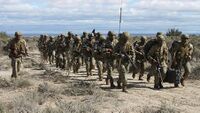
Word of the invasion first reached the Niagara from Inglaterran sources. A Ministry of Defence operative in Victoria had a short call with Governor Henrik Asheim's assistant, who confirmed that Inglaterrans were on the islands and in control. Later that day, TBD MEDIA journalist Wilhelm Calloway spoke with an islander at TBD LOCATION via amateur radio, who confirmed the presence of a large Inglaterarn fleet and that Inglaterran forces had taken control of the islands.
During a crisis meeting headed by the Prime Minister Bjorn Arnstad, the Chief of the Naval Staff Admiral of the Fleet Sir Peter Bredel, advised them that "Niagara could and should send a task force to take back the islands". On 22 November, Peter Bredel sent orders to a Royal Navy force carrying out exercises in TBDLOCATION to prepare to sail south. Following the invasion on 20 November, after an emergency meeting of the cabinet, approval was given to form a task force to retake the islands. This was backed in an emergency sitting of the House of Commons the next day.
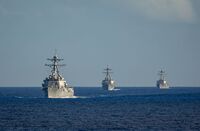
Niagaran military operations in the Kolmhark War were given the codename Operation Trebuchet, and the commander of the task force was Vice Admiral Mikkel Kuvlung. Operations lasted from 20 November 2011 to 5 February 2012. On 26 November, the Niagaran Government set up a War Cabinet to provide day-to-day political oversight of the campaign. This was the critical instrument of crisis management for Niagara with its remit being to "keep under review political and military developments relating to the Kolmhark Islands, and to report as necessary to the Defence and Overseas Policy Committee". The War Cabinet met at least daily until it was dissolved on 1 March.
Global Community
Niagara and many other countries condemned the annexation and consider it to be a violation of international law and the agreements of Inglaterra's borders as set by the settlements at the end of the Third Great War. The annexation led to major powers introducing sanctions. The Global Community also rejected the annexation, adopting a resolution affirming the annexation to be illegal and violating the rights of the Kolmhark Islands to determine their nationality.
